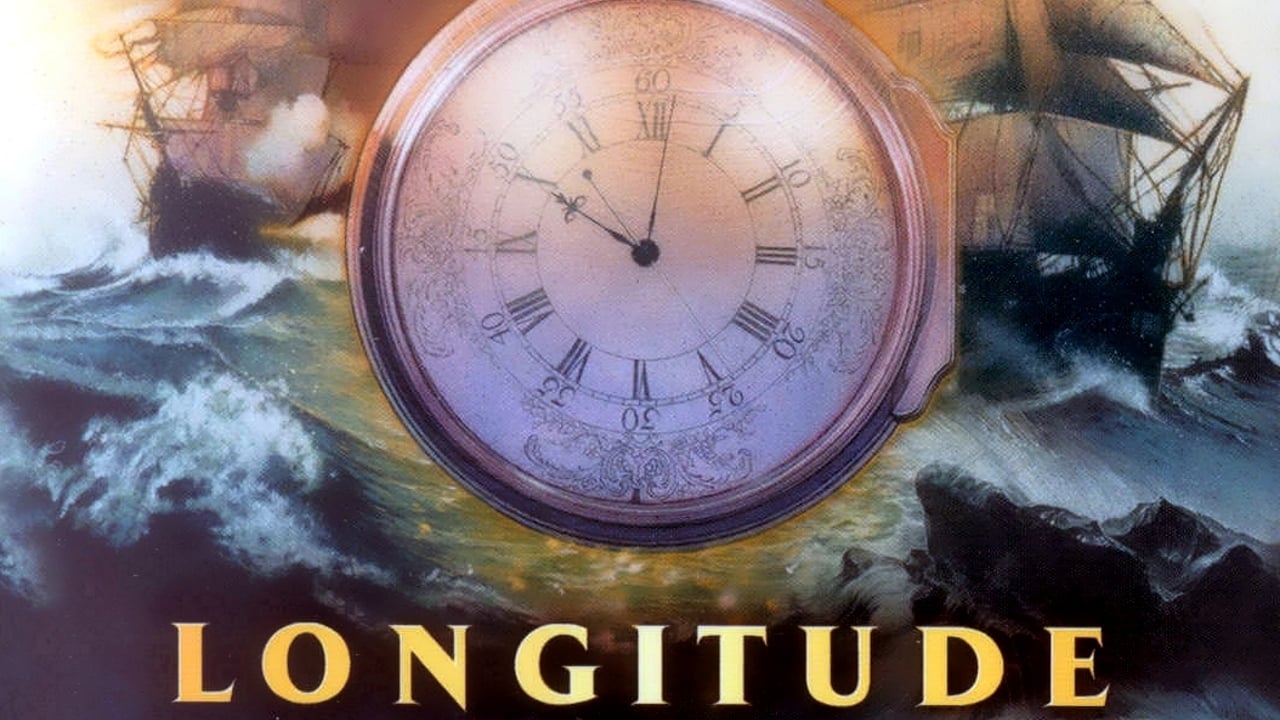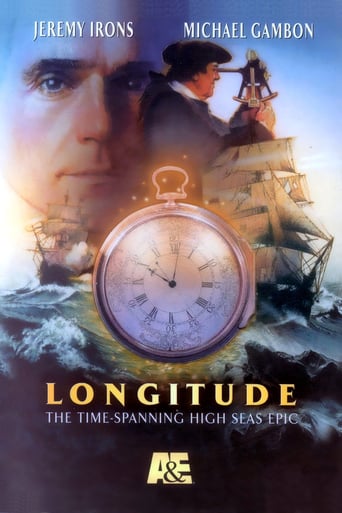

This feature film is pretty shocking, considering the subject. It opens with an able seaman in His Majesty's Navy being hanged from the yardarm in 1707 for keeping an independent log of the ships position, whose figures disagreed with those of the captain by some ninety miles. Really. And then they cut down the body and it falls to the deck with a plop. The captain's reckoning was off and the seaman's was right but it doesn't matter. Latitude at sea, that is, degrees north and south, is easy to determine. These are the lines that run east and west along the globe. If the north star, Polaris, is on the horizon, you're at the equator. If Polaris is directly overhead, you're at the north pole. By measuring the elevation of Polaris you can fix your latitude by degrees. Longitude -- the lines that run up and down on a map and indicate degrees east and west -- is much more difficult because it requires an accurate timepiece, one that doesn't depend on a pendulum. (Ships rock and roll.) Well, Britain is an island, and a seafaring nation, about to launch its colonial period. They need navigation more accurate than dead reckoning. The merchant ships and men of war need to know where they are and where they are going. That is, it's usually better to sail around the Cape of Good Hope rather than into it. So the government offers a prize for anyone who devises a solution to the problem. Some of the devices offered depend on using magic on wounded dogs and are pretty funny.Carpenter Michael Gambon devises a clock the size of a refrigerator that he hopes is immune to the ship's movement and he's given permission to try a test run back and forth to Lisbon. The results are inconclusive and he continues with his work, running out of money and always running up against the Royal Society and its preference for "scientists" over "carpenters" -- scientists who believed that the pineal gland was the seat of emotions.Meanwhile, there are rather abrupt cuts to the 1930s, where we see Jeremy Irons trying to reconstruct Gambon's antique clocks, now all weathered and stuck. It's frustrating work. Irons can't get much help either because he's been divorced and because he suffered from a nervous breakdown, as it was called in the 30s. It's irritating too, as Irons proceeds to duplicate Gambon's work, to find that when he had a problem, Gambon attached a corrective device. When that proved not accurate enough, he attached still another corrective device, until layer upon layer of corrective devices made the whole mad construction impossible. Still, in their parallel universes, both Gambon and Irons persist. These cuts, by the way, may sound more confusing than they are. Once the characters and settings are established, there's no problem.It's reasonable to ask how much a viewer needs to know about a clock's innards before he can follow developments. It's easy. You only need to know the elements of potential energy, torque, bevels, a folio balance and verge escapement, a high ratio weight gear train, parallax, the piezoelectric effect, the Zeigarnik effect, Ohm's law, the Purkinje effect, the properties of subatomic particles, the genitalia of Saurians, Marbe's law, Murphy's law, and who Christiaan Huygens was. Actually, you don't need to know anything about clocks except that if they're accurate enough they can tell longitude. It demands nothing but patience. There's even an exchange of shots at sea with a Spanish privateer to liven things up.Both Gambon, who plays John Harrison, and Jeremy Irons, who plays Rupert Gould, are balked at almost every turn, not only because of the nature of the technical problems they face but because of what might be called paradigmatic inertia. When you are dealing with a Royal Society that believes that curing illness requires bleeding the patient, you're going to have a hard time convincing them that a watch the size of a small frying pan will tell longitude. And in Iron's case, he was trying to find money in a country that was recovering from a depression and simultaneously preparing for war.Both are successful in their pursuits. Gambon's character worked on his time pieces for fifty years and was finally awarded the prize he sought, not from the board of scientists but from Parliament. He was eighty years old. Iron's character recovered and became a well-known media figure specializing in science, and was eventually made curator of a prominent museum. All of these struggles are fleshed out and non-trite. What they led to is the reason all the world today measures its time according to "Greenwich Mean Time" or GMT.In a way the program resembles an afternoon soap opera except that it has a much better budget, the writing and dialog are light years advanced, the characters are more flesh than cardboard, the direction is more sensitive and trusting of the viewer, the central theme isn't love but a problem that exists in nature, and the acting is exquisite. Both Irons and Gambon are nearly perfect in their entirely different ways -- Gambon proud and blustery, Irons neurotic and timid.Irons is required to enact another breakdown of an unspecified source. It looks like a manic episode. In the 30s, there was no way of dealing with it except to knock the patient out with narcotics. Without that, you have a real-life "raving lunatic" on your hands. Fortunately, the extreme episodes tend not to last too long. The hospitalized Irons gets a radiantly beautiful nurse, Lucy Akhurst. They always get good-looking nurses in the movies. She's not only good for him; she's good to him.
... View MoreStaying with my in-laws in rural Ireland,kids,wife and said in-laws watching ER or whatever,I had to stay in the kitchen to watch on a small portable TV this film I thought would be interesting.(Dirty dishes,dogs etc...). I was taken aback quite from the start. The actors (Gambon,Irons..)were terrific,but more so,believable.After 30mns I forced my dad-in-law to at least have a look at the show,which he did.We didn't leave that kitchen for the 3 nights the series was on and merrily sorted out the after-dinner mess,all the while conversing on how to build IT.Anecdote: on the last night my eldest aughter who was 7 came into the kitchen to see what we were watching,and at that age, was captivated. It is also a great tribute to the ethics of learning and wanting,working to achieve something. Sorry if I sounded a bit Victorian in that sense.(Am not). Please watch and recommend this.
... View MoreI thought this film was over-long, in particular the Gould/Irons story was boring and irrelevant, and the piece would have benefited by cutting this bit out altogether.Being a firm believer that truth is stranger and more interesting than fiction I was also disappointed by the sensationalising of events. This sort of dumbing-down of history is a real insult to viewers. The plot took the easy option at every point - the "Board" are villains from start to finish, Harrison not only proves his clock works but saves the bacon of the of ship or fleet at every turn, the proponents of the rival astronomical systems are all bungling fools. All nice cosy escapism I suppose. However, the acting was fine and the production values superb.
... View MoreDec2004 update: I did eventually buy the DVD set, and it is very nice."Longitude" is a towering achievement as a movie. Shown in 4 hours on A&E network, I taped it to skip the commercials and was able to watch it in just over 3 hours. I only give ratings of "10" to truly remarkable movies, and this is one. It helps to be a scientist, and to have had a life-long fascination with navigation and timepieces.The story is historical - the British government passed an act in the early 1700s for a prize of 20,000 Pounds for the first to provide an accurate and practical means of establishing longitude at sea. A Board of Longitude,comprising self-important scientists, would judge when the challenge was met.John Harrison, a carpenter who understood the sun's apparent movement with the Earth's rotation, figured you could do it with a very accurate clock. He, with help from his son William, did it over a period of about 50 years, and met all conditions with his 4th clock, but the board kept throwing up roadblocks to avoid giving the award to someone who was not a scientist but a mere "carpenter." Finally, when Harrison was 80, ironically in the year 1776, was given the prize by Parliament. He died only two years later.The ancient story was interwoven with a WWII-era story of a man, played by Jeremy Irons, who undertook to restore all of Harrison's old clocks, and finally succeeded against similar resistance that Harrison had faced.If you either are not a scientist, or do not appreciate the magnitude of Harrison's effort, and its contribution to modern navigation, then it is possible that you would find this movie somewhat boring. Do yourself a favor - don't waste your time. For me, it remains one of the absolute best movies I have ever seen, both in significance of the story and the mastery of the acting and direction.
... View More